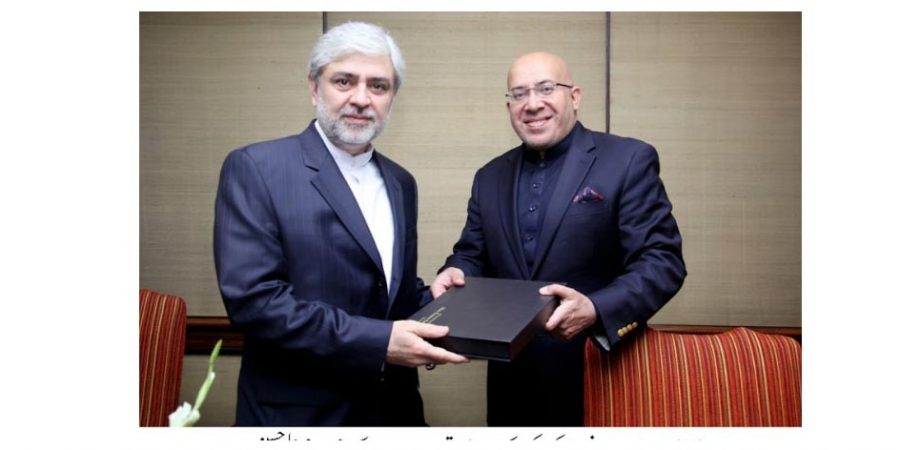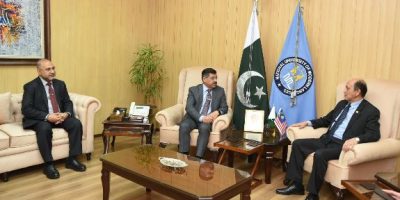Pakistan, Iran have huge potential to enhance bilateral trade: Ambassador

LAHORE, MAR 01 (DNA) – The newly-appointed Iranian ambassador to Pakistan Syed Muhammad Ali Hussaini has said that there is a huge potential to enhance bilateral trade between Iran and Pakistan.
During a meeting with PIAF chairman Mian Nauman Kabir, he had a detailed discussion on trade and economic relations between the two countries. He said that Iran and Pakistan should concentrate on trade and economic activities to further improve bilateral relations, saying that both countries should adopt new approach and forward with fastest pace.
Though trade between the two countries is growing gradually, but still it is below the potential, he said, adding that business organizations of the two countries should be given wake-up call so that they can play their due role for the strengthening of trade and economic ties.
Iranian envoy said that despite all odds, bilateral trade between the two countries was good. He hoped that mutual trade and economic relations would be stronger in future. He said that Pakistan and Iran have common borders and cultural bonds. Iran has always tried to strengthen the bilateral relations with neighboring countries and first priority was Pakistan. He said that Iranian embassy would extend full support to the trade delegations.
PIAF chairman Mian Nauman Kabir, on this occasion, stated that despite being brotherly countries, trade remains low. Hence, Pakistan and Iran must make collective efforts to explore new avenues. It has always been our struggle to promote bilateral trade and the PIAF has a very positive approach towards improving trade ties particularly with neighboring countries.
He pointed out that the bilateral trade between Pakistan and Iran was much less than the potential as Pakistan exports stood at a mere $330.2 million while the imports were around $1.247 billion during 2018 which can be enhanced to $5 billion within very short period.
Mian Nauman Kabir noted that the negotiations on Free Trade Agreement (FTA) are underway as both the countries have shared their desire of upgrading Preferential Trade Agreement (PTA) into the FTA for which initial drafts have already been shared while the State Bank of Pakistan has also shared draft of Memorandum of Understanding (MoU) for signing its Banking Paying Arrangement (BPA) with Central Bank of Iran.
Both countries have already signed MoU through which channels would be opened in the central banks of both the countries for trade transactions that would reduce the usage of dollar account for Letter of Credit (LC) clearance.
He hoped that the desperately needed proper banking channel between Pakistan and Iran becomes a reality soon which would surely boost the existing trade ties.
He was of the opinion that abundant opportunities were available in the Iranian dairy, livestock, meat and the beverages sectors for Pakistani traders and investors while Pakistan can also take benefit from Iran’s petrochemical sector.
PIAF chairman underscored the need to sort out infrastructural constraints to enhance bilateral trade via the Quetta-Taftan land route whereas the regular operation of ECO container trains will lend impetus to cargo and transit facilities between the two countries.
He said that Pakistan and Iran have large domestic markets and unique geo-strategic competitive advantage. In order to make use of each other’s strong areas, both countries would have to make joint efforts. He said that the latest trade figures did not reflect the actual potential between two countries. He said that there were some bottlenecks in the way of increasing trade which required to be addressed on priority basis. By reducing smuggling and undocumented trade, we can improve the figures of bilateral trade, he said.=DNA
=======
Related News

Jordan Ambassador greets Bangladesh counterpart
ISLAMABAD, 20 FEB (DNA) — The Jordanian Ambassador to Pakistan, Dr. Maen Khreasat, met withRead More

NUML hosts Malaysian envoy for academic talk
ISLAMABAD, FEB 20 /DNA/ – Ambassador Dato’ Mohammad Azhar Mazlan, High Commissioner of Malaysia toRead More


Comments are Closed